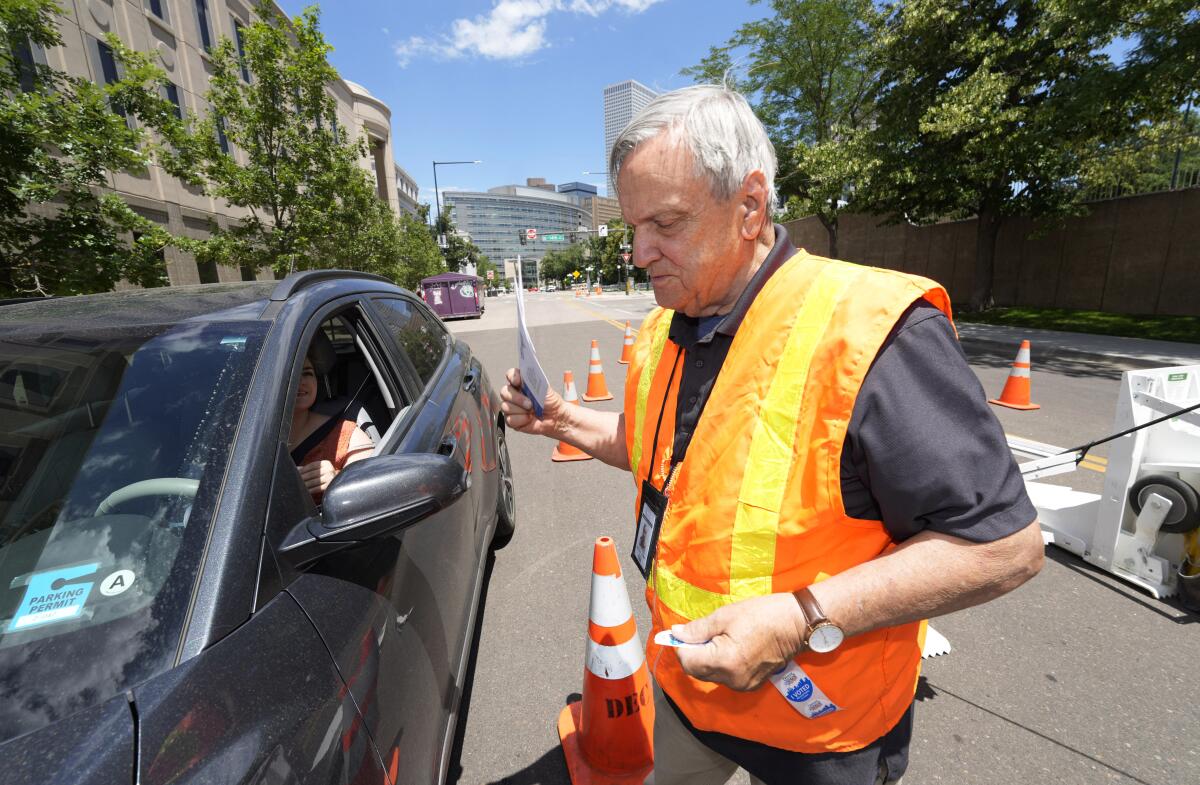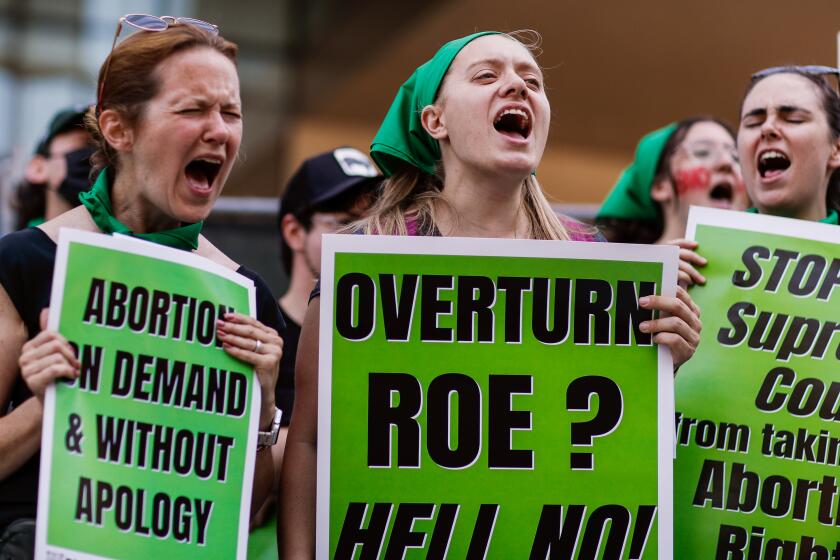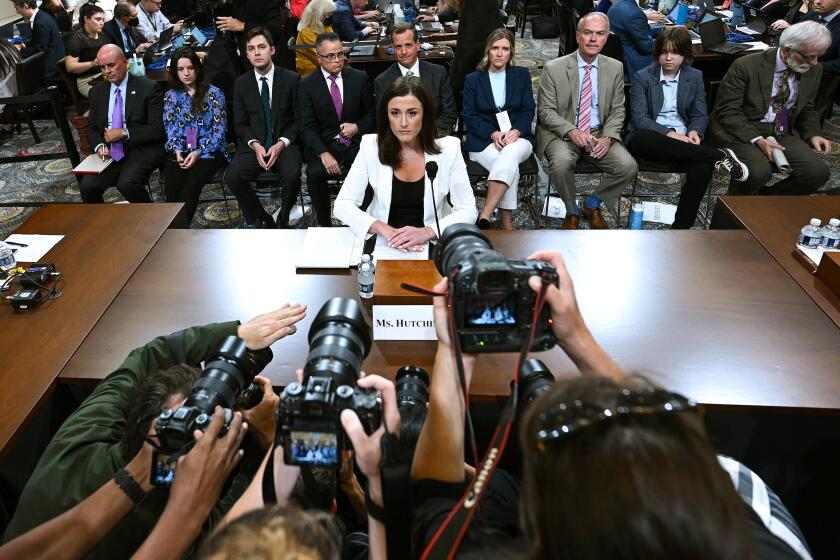Colorado GOP picks abortion rights supporter in Senate race

DENVER — Colorado Republicans on Tuesday nominated a businessman and supporter of most abortion rights for U.S. Senate while rejecting an attempt by one of the nation’s most prominent election deniers to become their candidate for the state’s top voting post.
Joe O’Dea won the GOP Senate nomination after saying he supported a late-term abortion ban but, before then, the decision should be left up to “a woman and her God.”
At the same time, Mesa County Clerk Tina Peters, who has been indicted for her role in a break-in of her county’s own election system, lost her bid for the party’s secretary of state nomination. It was won instead by Pam Anderson, a former suburban Denver clerk who has been critical of former President Trump’s election lies, which Peters has embraced.
The wins came as voters in seven states cast ballots in the first primaries since the Supreme Court last week revoked the constitutional right for women to obtain abortions.
Also on Tuesday, Illinois Republicans chose a supporter of an abortion ban with no exceptions as their gubernatorial candidate.
State senator and farmer Darren Bailey gained Trump’s endorsement and more than $16 million in support from Democrats, who pushed conservatives to select him over Richard Irvin, the first Black mayor of Aurora, the state’s second-largest city. Irvin was seen as a far more formidable challenger to Gov. J.B. Pritzker, and was backed heavily by Republican donors.
Senate Constitutional Amendment 10 would, if approved by voters, further codify the state’s already progressive reproductive rights.
Democrats unsuccessfully tried to replicate their Illinois strategy in Colorado. There, Democrats spent more than $4 million to boost the U.S. Senate campaign of State Rep. Ron Hanks, who favors an abortion ban without exceptions, in order to deny the GOP nomination to O’Dea. O’Dea is seen as a far stronger candidate against the incumbent, Democratic Sen. Michael Bennet.
Abortion became an even more fraught issue in Tuesday’s primaries after the Supreme Court decision. Political operatives predict more electoral bank shots like the one Democrats executed in Illinois as Republicans feel emboldened by the repeal of the 1973 ruling in Roe vs. Wade.
The strategy carries risks, especially if the magnitude of the GOP’s expected gains this fall becomes so significant that Democrats lose in states like Illinois and Colorado, which have become strongholds for the party. But at a moment when Democrats are confronting voter frustration over inflation and rising gas prices, the focus on abortion may be their best hope.
“It’s a very inviting target, to go after a Republican candidate whose position is no exceptions,” said Dick Wadhams, a former chairman of the Colorado GOP who has worked for antiabortion candidates in the past. “I do think the repeal of Roe vs. Wade may embolden more candidates to go in that direction.”
Beyond Colorado and Illinois, elections are being held in Oklahoma, Utah, New York, Nebraska, Mississippi and South Carolina. Tuesday marks the final round of multistate primary nights until August, when closely watched races for governor and the U.S. Senate will unfold in Arizona, Wisconsin, Florida, Missouri and other states.
And while Tuesday’s primaries are the first to happen in a post-Roe landscape, they offer further insight into the resonance of Trump’s election lies among GOP voters.
Cassidy Hutchinson revealed that White House officials knew about the risk of violence on Jan. 6 in the days prior to the insurrection.
In Oklahoma, one of the nation’s most conservative senators, James Lankford, won his primary challenge from evangelical pastor Jackson Lahmeyer, amid conservative anger that Lankford hasn’t supported Trump’s election claims.
In Utah, two Republican critics of Trump are targeting Sen. Mike Lee, accusing the two-term senator of being too preoccupied with winning the former president’s favor and helping him try to overturn the 2020 presidential election. In Mississippi, Rep. Michael Guest, a Republican who bucked Trump to vote for an independent Jan. 6 commission, faces a challenge from Michael Cassidy, a former Navy pilot.
Also in Colorado, firebrand Rep. Lauren Boebert easily defeated her primary challenger, moderate state Sen. Don Coram.
Other GOP opportunities in the state come in the newly created congressional swing seat north of Denver, where four Republican candidates are competing to face state Rep. Yadira Caraveo, the only Democrat running in the primary. Heidi Ganahl, the lone statewide elected Republican as a member of the University of Colorado’s board of regents, won the GOP nomination to face Democratic Gov. Jared Polis.
In Colorado Springs, Republican Rep. Doug Lamborn, who faces regular primary challenges, this time is fighting back state Rep. Dave Williams, who failed to get the phrase “Let’s Go Brandon,” code for an obscenity against President Biden, added to his official name on the ballot.
Other than the governor’s race primary, Illinois also features two, rare incumbent vs. incumbent congressional primaries as a result of House districts being redrawn during last year’s redistricting. Democratic Reps. Sean Casten and Marie Newman will compete in a Chicago-area seat. And GOP Rep. Rodney Davis, one of the last moderates in the Republican caucus, faces Trump-backed Rep. Mary Miller, who at a rally with the former president this weekend described the Supreme Court decision as “a victory for white life.” A spokesman said she meant to say “right to life.”
Former President Trump uses primary endorsements to seek revenge, push election fraud lies and shape the Republican Party. How are his candidates faring?
In the smaller towns of Illinois, conservative voters were hankering for a change. Toni Block, 80, of McHenry, about 45 miles northwest of Chicago, voted for Bailey in the gubernatorial primary.
“He’s got all the good things that we need to get back to,” Block said. “Not only is he a Trump supporter, he has our values.”
In New York, Democratic Gov. Kathy Hochul, who became the state’s chief executive last fall when Andrew Cuomo resigned during a sexual harassment scandal, fought off primary challenges from the left and center. New York City’s elected public advocate, Jumaane Williams, contended Hochul hasn’t been active enough on progressive issues while Long Island Rep. Tom Suozzi blasted her for being too liberal on crime.
On the Republican side, Rep. Lee Zeldin is the front-runner in a crowded gubernatorial primary field that includes Andrew Giuliani, the son of former New York mayor and Trump confidant Rudolph W. Giuliani. Trump has not made an endorsement in the race.
More to Read
Get the L.A. Times Politics newsletter
Deeply reported insights into legislation, politics and policy from Sacramento, Washington and beyond. In your inbox three times per week.
You may occasionally receive promotional content from the Los Angeles Times.













